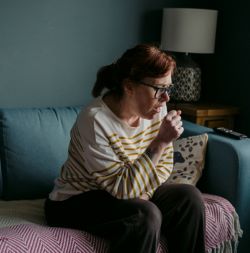Submitted by Rachel Gardner on Mon, 14/08/2023 - 16:46
 Researchers using AI to identify patients at risk of developing severe respiratory tract infections have just won support from UK Research and Innovation.
Researchers using AI to identify patients at risk of developing severe respiratory tract infections have just won support from UK Research and Innovation.
The RELOAD study - REspiratory disease progression through LOngitudinal Audio Data machine learning - is being funded as part of a new government mission to support AI innovation to speed up health research.
The project will use AI to analyse the sounds of patients' breathing and speech and diagnose those who are at risk of becoming severely ill.
It is one of 22 new projects that Michelle Donelan, Secretary of State for Science and Technology, revealed last week would receive funding to explore how to develop and use AI in health.
Identifying patients at higher risk could reduce hospital admissions, cases of severe illness and the number who die.
Cecilia Mascolo
The Principal Investigator on the RELOAD project is Cecilia Mascolo, Professor of Mobile Systems here. The collaborative project also includes Professor Pietro Cicuta in the Cambridge University Department of Physics; Professor Nick Francis, head of the Medical School at Southampton University; and Professor Anna Barney, Professor of Biomedical Acoustic Engineering at Southampton University.
"Respiratory tract infections are the most common cause of illness," Cecilia explains. "They're usually mild, but in some cases the illness can become severe and even lead to death. While most people recover without needing treatment, we need to identify quickly when a patient is becoming seriously ill as otherwise the effect on them - and on healthcare services - can be very significant."
Doing this by using machine learning (AI) systems to analyse patients' breathing and speech sounds, and automatically detect if they are becoming more seriously ill, could be a 'game-changer', she adds.
"It could reassure those patients who don't need to see a doctor, and reduce antibiotic prescription by identifying those patients who will get better on their own. Meanwhile, identifying patients at higher risk could also reduce hospital admissions, cases of severe illness and the number who die. All these effects would reduce pressure on the NHS."
Cecilia Mascolo and Pietro Cicuta have previously collaborated on the development of the COVID-19 Sounds app, which collected short recordings of people coughing and breathing and used machine learning algorithms to detect if they were suffering from COVID-19. And from their previous work, the researchers are already aware of signs like faster breathing that indicate whether a respiratory tract infection (RTI) is getting worse.
"We know we can measure these signs by recording the sound of the breath," Cecilia says. "We believe other breathing sounds and patterns are also likely to change when you get an RTI and this is something we want to explore in this project."

